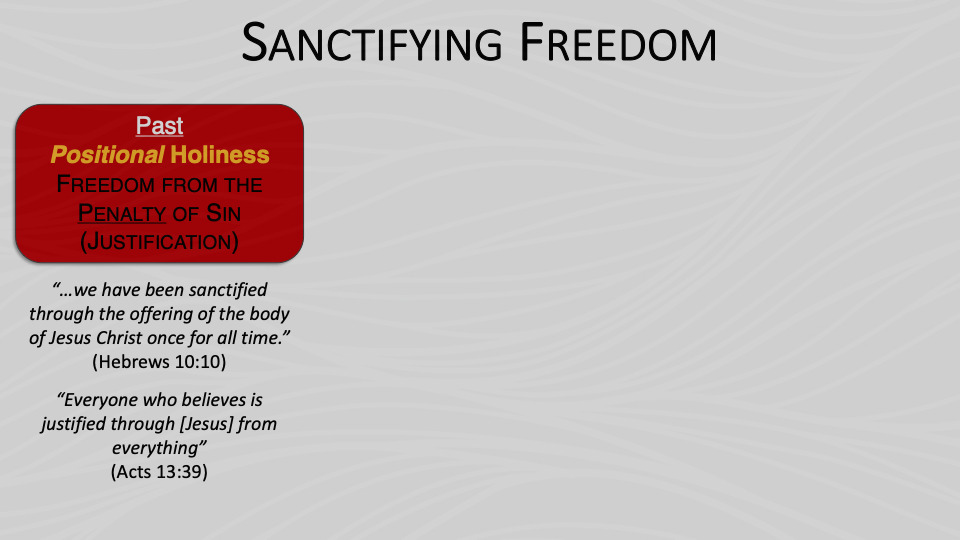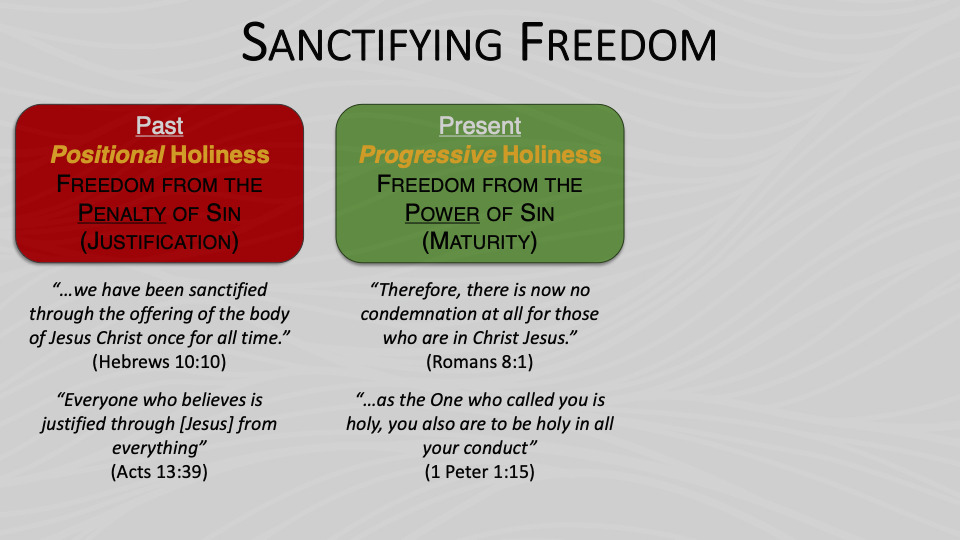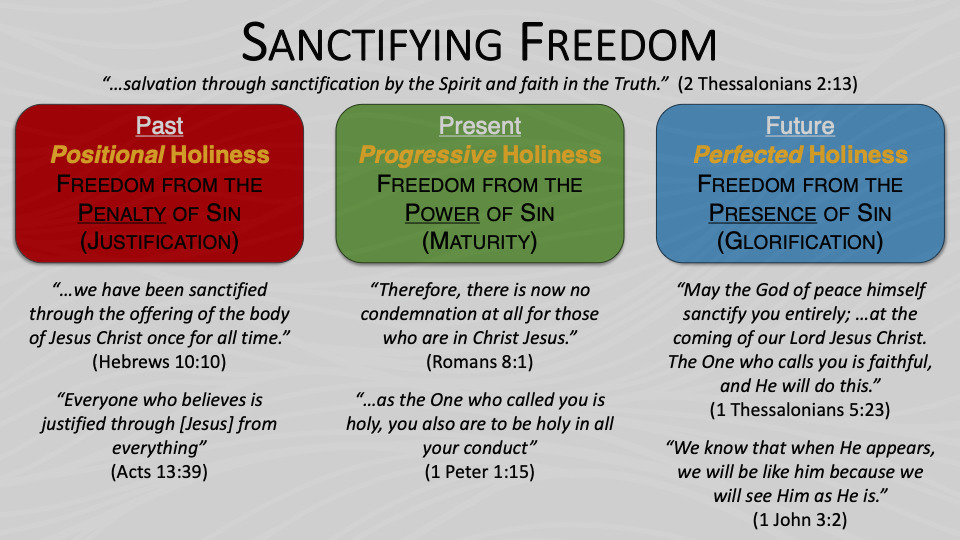Sanctifying Freedom
As I was having a chat with my brother-in-law recently on things theological – specifically, on sanctification – it struck me just how muddled these concepts can become at times. It’s not that there can’t be great depth to them, but what was the great mystery of our salvation has been revealed through Jesus – and sanctification is part of that. We can un-complicate sanctification by simply recognizing that those who are sanctified are the same ones named as saints all throughout the NT (i.e.: those made holy are holy ones – the root of both words in the original Greek, αγιος, is the same). We are saints now, just as we are sanctified now, and just as we are children of our Father now… but what we will be has not yet appeared (1 John 3:2).
Nevertheless, I’d like to dig a bit deeper into how I’ve come to understand sanctification.
Words like salvation and especially sanctification, along with many other churchy words, can often be misinterpreted and misunderstood. I was raised with a rather fearful and precarious misunderstanding of salvation that could slip from my grasp at any moment with the slightest failure – and an even more awkward misunderstanding of sanctification that was much more about striving and bondage than freedom. But the Scriptures give us a very different vision of the Christian life.
Now the Lord is the Spirit, and where the Spirit of the Lord is, there is freedom.
2 Corinthians 3:17
For freedom Christ has set us free; stand firm therefore, and do not submit again to a yoke of slavery.
Galatians 5:1
So, let’s unwrap this true freedom that is born of sanctification. In order to do so, we should first ensure a mutual understanding of what we mean by these two words – freedom & sanctification – as well as their relationship to each other.
Freedom can simply be understood as the power of self-determination; the power to act according to one’s own will. We widely recognize the self-evident truth that with power comes responsibility. Indeed, with every freedom comes a set of responsibilities; and this is made obvious as we witness the fallout of irresponsibility – whether that of others or of our own.
Sanctification is to be made holy (i.e.: set apart for a sacred purpose). Now this opens up quite a number of other thoughts…
Set apart from what?
…and set apart to what?
…and set apart by what means?
…and set apart for what purpose?
…and, particularly, set apart when?
We are set apart (sanctified)…
from sin, for righteousness.
from this world, to God.
by the Holy Spirit giving us new birth.
by the Holy Spirit living within.
by the Word of Truth.
Our sanctification (aka saintliness or holiness) has everything to do with freedom from sin…
the penalty of sin
the power of sin
the presence of sin
One momentous question remains…
When are we sanctified?
We can weave all this together into three groups of threes:
3 aspects of holiness
3 freedoms from sin
3 time dimensions
Let’s begin with the beginning of our salvation journey…
In the past, through the Cross of Jesus, God granted us freedom from the penalty of sin (making it just as if we had not sinned) when we were born-again in the Spirit – giving us positional holiness in Christ.
We have moved from…
unbelief to belief
lost to saved
sinner to saint
unholy to holy
slave to free
But what about now… our everyday living in holiness?
These positional movements/changes in status don’t always feel perfectly real or complete – like we’re not quite there yet. All throughout our Christian walk, there is an ever-increasing spiritual maturity that we are called to – here in the present. This is where I’d like to focus our attention for a bit. We’ll hear now from the Apostle Paul to the Romans.
So I find it to be a law that when I want to do right, evil lies close at hand. For I delight in the law of God, in my inner being, but I see in my members another law waging war against the law of my mind and making me captive to the law of sin that dwells in my members.
Romans 7:21-23
Paul uses the term “law” here in the sense of a universal principle – like a law of science – this of course being a spiritual law. This passage serves as a summation of the preceding few verses. Here Paul speaks freely – with an authenticity and vulnerability that can be hard for some of us to identify with – unless we’re willing to be truly honest…
For I do not understand my own actions. For I do not do what I want, but I do the very thing I hate. Now if I do what I do not want, I agree with the law, that it is good. So now it is no longer I who do it, but sin that dwells within me. For I know that nothing good dwells in me, that is, in my flesh. For I have the desire to do what is right, but not the ability to carry it out. For I do not do the good I want, but the evil I do not want is what I keep on doing. Now if I do what I do not want, it is no longer I who do it, but sin that dwells within me.
Romans 7:15–20
Whether you’re a new disciple of Jesus or have been walking with Him for years, honest and sincere self-reflection on a continual daily basis reveals both sins of commission and sins of omission.
Just as we pray in our confession – “the things we’ve done and left undone”
Some sins we are very acutely aware of – often painfully so.
Some we become aware of over time.
Others we may not even recognize for most of our lives – for God is gracious and merciful to not reveal to us in one flash the weight of every way in which we are less than the measure of His perfect Holy Love. Yet as our sins are revealed, we can find ourselves agonizing over the war within – as Paul says here in v.24:
Wretched man that I am! Who will deliver me from this body of death?
Romans 7:24
Every one of us can honestly admit, we’ve had days or moments or even seasons like this. But praise be to God, Paul doesn’t stop there – instead he answers with v.25:
Thanks be to God through Jesus Christ our Lord!
…and then summarizes, once again:
So then, I myself serve the law of God with my mind, but with my flesh I serve the law of sin.
Romans 7:25
But what is the true nature and reality of this answer that is “through Jesus Christ our Lord”?
The key follows next…
There is therefore now no condemnation for those who are in Christ Jesus.
Romans 8:1
Altogether now – with all the breath in our lungs – let’s read aloud that glorious proclamation of our freedom again!
There is therefore now no condemnation for those who are in Christ Jesus.
Romans 8:1
Now, with that settled in our hearts, let us ensure a full grasp of sin – its weight, and our response to it. Make no mistake – sin is awful and pervades all of creation. John, in his first letter, lays out this essential doctrine of sin – so let none of us try to pretend we’re sinless.
If we say we have no sin, we deceive ourselves, and the truth is not in us. If we confess our sins, He is faithful and just to forgive us our sins and to cleanse us from all unrighteousness. If we say we have not sinned, we make Him a liar, and His word is not in us.
1 John 1:8-10
Rather than believing the lie that we are sinless, we need to confess our sin as it is revealed to us so that we can grow in holiness – this is the maturity that we find as we are freed from the power of sin in each area of our lives that the Spirit of Jesus works through. Correspondingly, we aren’t to go on carelessly or purposely practicing sin either.
Everyone who makes a practice of sinning also practices lawlessness; sin is lawlessness. You know that He appeared in order to take away sins, and in Him there is no sin. No one who abides in Him keeps on sinning; no one who keeps on sinning has either seen Him or known Him. Little children, let no one deceive you. Whoever practices righteousness is righteous, as He is righteous. Whoever makes a practice of sinning is of the devil, for the devil has been sinning from the beginning. The reason the Son of God appeared was to destroy the works of the devil. No one born of God makes a practice of sinning, for God’s seed abides in him; and he cannot keep on sinning, because he has been born of God. By this it is evident who are the children of God, and who are the children of the devil: whoever does not practice righteousness is not of God, nor is the one who does not love his brother.
1 John 3:4–10
The more honestly aware we are of our sin, the more wretched we can feel if we just get stuck in that awareness and fail to take the next step – for the next step for the disciple of Jesus is to return to the foot of the Cross. That glorious Cross on which Jesus became the very sin that you and I are feeling so wretched about (2 Corinthians 5:21). There He suffered and died for those sins and as He was crushed, He crushed the power of sin and death and the grave in stunning victory as He rose to the new life that He invites us to join Him in. We have but to confess our sin to God and receive the forgiveness that He freely offers to us.
But how many times will Jesus actually forgive us?!
Folks, when Jesus’ disciples suggested forgiveness as much as 7 times (metaphorical perfection in their eyes), Jesus responded with 490 times (Matthew 18:21-22) as a way of expressing the perfectly infinite forgiveness that He gives and that we are to give as well. And along with that forgiveness, God gives us the gift of repentance (Acts 5:31, 11:18) so that we can live in His freedom and not keep practicing sin, but practice righteousness. Repentance is the power to turn from the flesh and live in the Spirit…
day by day
step by step
word by word
action by action
…continually becoming more and more like Jesus.
Paul describes this next:
For the law of the Spirit of life has set you free in Christ Jesus from the law of sin and death. For God has done what the law, weakened by the flesh, could not do. By sending His own Son in the likeness of sinful flesh and for sin, He condemned sin in the flesh, in order that the righteous requirement of the law might be fulfilled in us, who walk not according to the flesh but according to the Spirit. For those who live according to the flesh set their minds on the things of the flesh, but those who live according to the Spirit set their minds on the things of the Spirit. For to set the mind on the flesh is death, but to set the mind on the Spirit is life and peace.
Romans 8:2-6
This whole process is the salvation of sanctification by the Spirit. Paul refers to it specifically in writing to the Thessalonians:
…God chose you as the firstfruits to be saved, through sanctification by the Spirit and belief in the truth.
2 Thessalonians 2:13
It does require our surrendered understanding and committed participation. As we set our minds increasingly on the things of the Spirit rather than the flesh we are continually being sanctified (i.e.: made more holy) and being renewed in the image of Christ Jesus our Lord (Colossians 3:10).
Now, we will experience crisis moments in our faith all throughout our walk here on earth. Some will be far greater than others. Some will make us feel much more wretched than others. Yet through them all, we must learn to faithfully grow as we embrace the process – knowing that there is no condemnation for us who are in Christ Jesus. The wretchedness we feel is the very real godly sorrow for sin; but never let it be the condemnation of Satan who only wants to blind us to the glorious grace of the Cross of Jesus. Satan knows his doom and defeat are already complete, so he desperately wants to drag as many as he can into isolation and separation from God – down to eternal destruction.
Don’t listen to his lies…
Jesus is our victorious freedom!
We have but to confess and receive the free gifts of forgiveness and repentance. There is nothing to fear about this process for there is nothing to fear in perfect love (1 John 4:18).
Hallelujah for the Cross!
Hallelujah for the empty tomb!
Hallelujah for the Lamb upon His throne in victory Who continually intercedes for us!
Hallelujah for the Spirit Who both convicts and intercedes for us – even with groaning beyond what our words can express (Romans 8:26) as we sense our wretchedness.
Hallelujah for the salvation of sanctification!
Hallelujah for sanctifying freedom!
And then one day, we will receive the fulfillment and completion of all that God has begun in us (1 Thessalonians 5:23). In our future glorification with Christ, we will be perfectly freed from the presence of sin forevermore! This is Sanctifying Freedom!
So then – let us diligently exercise the kind of responsibility that such gloriously divine freedom demands of us.



